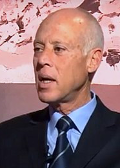|
Retired Law Professor Saied to Head Tunisian Government
October 13, 2019
The new President of Tunisia is Kais Saied, a law professor who was not part of the political establishment and ran an independent campaign. The national electoral commission reported that 72.71 percent of voters cast their votes for the 61-year-old Saied. It was a runaway win for the retired academic who promised to fight corruption and support moves to transfer some governmental power away from the federal apparatus. A regular television commentator, he was part of the committee who helped draft the country's new constitution, in 2014. Voting was in a runoff, as mandated because no candidate received a clear majority the first time around. Saied had finished first in the first round of voting, with 18.4 percent of the vote. The candidate with the second-highest total of votes (15 percent) in the first round was Nail Karoui, the business tycoon who spent much of the campaign in jail, having been arrested on charges of tax fraud and money laundering. Karoui strongly denied the accusations and has promised an appeal. He was released from prison four days before the election. The two candidates participated in a public debate two days before the election. Turnout was at 55 percent, electoral officials said. A total of 26 candidates were on the ballot to replace Beji Caid Essebsi, who was elected president in 2014 with a large turnout of voters eager to exercise that kind of power for the first time. Essebsi, at 92 the oldest leader of a country in the world, died in July. At that time, Mohamed Ennaceur began serving as interim president. He announced that he was not running for president. The country had a long history of occupation, which ended with independence from France in 1956. The new nation formed a short-lived constitutional monarchy, which was then replaced a representative government. Ben Ali was prime minister in 1987 when he ousted then-President Habib Bourguiba and took over the government. |
Social Studies for Kids |
Social Studies for Kids
copyright 2002–2024
David White





